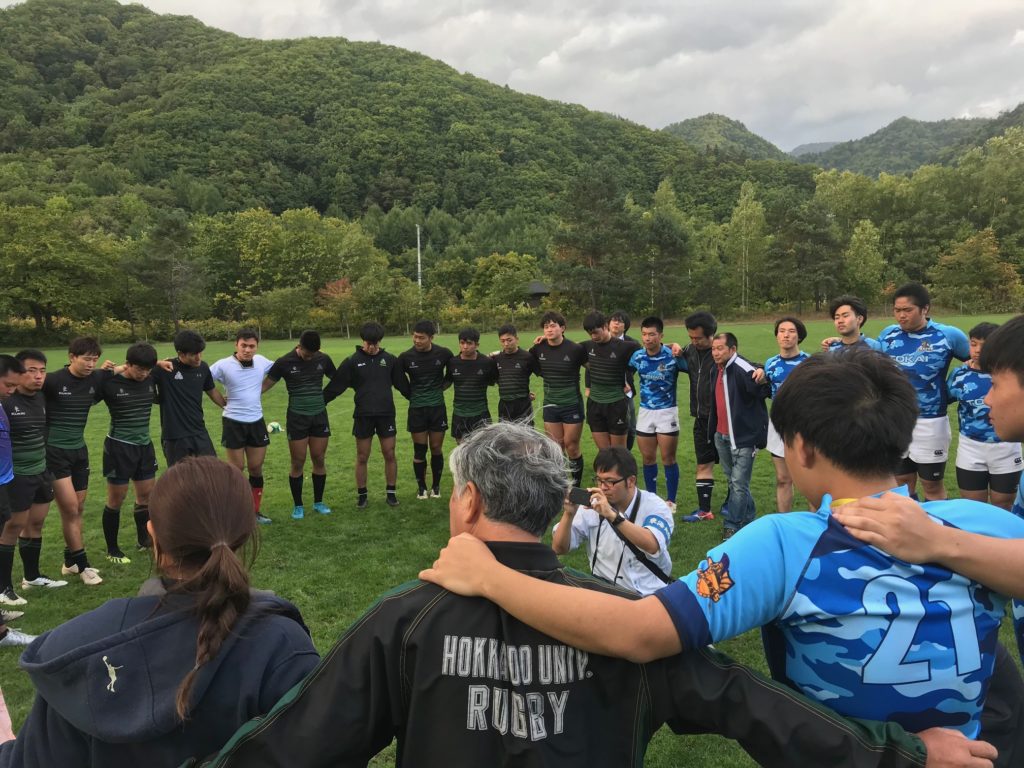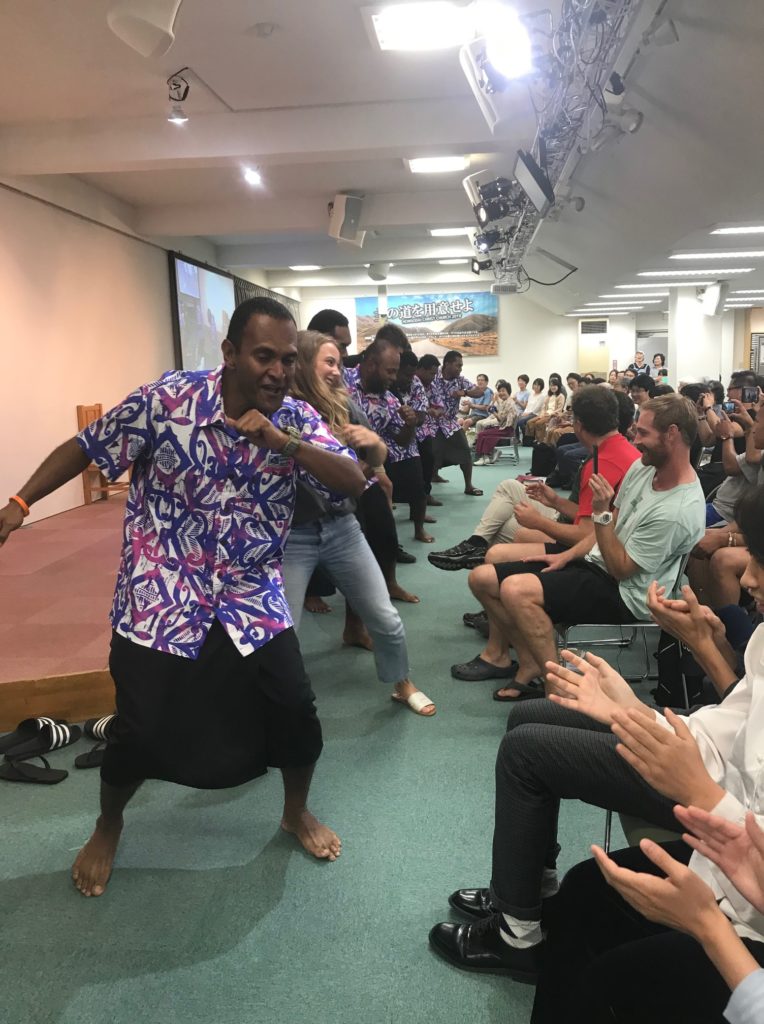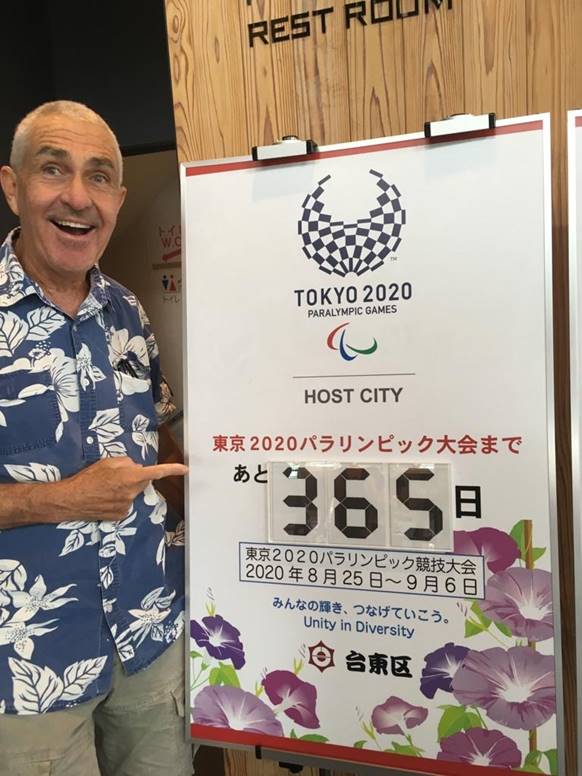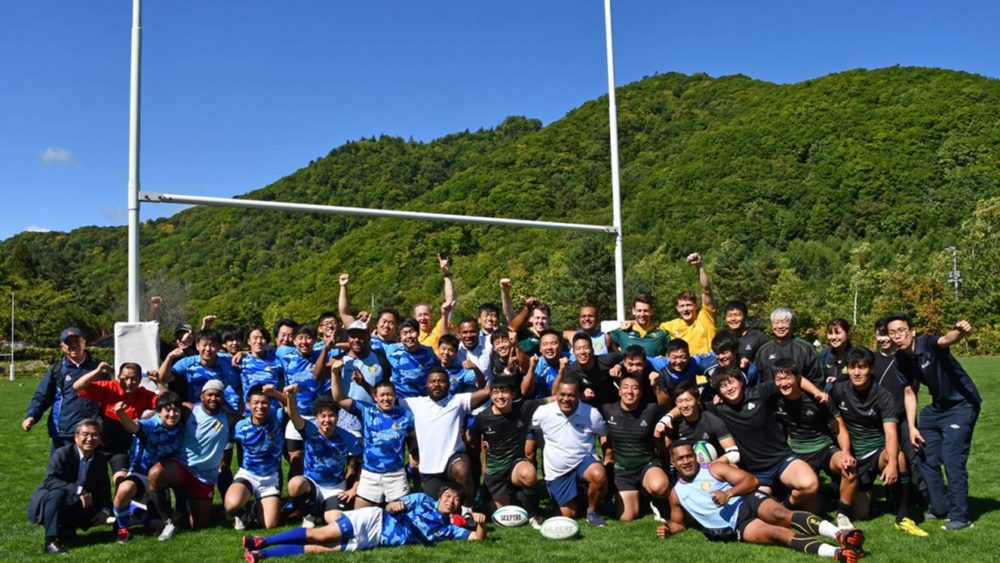God is using the Rugby World Cup to break down barriers to the gospel in sports-mad Japan in a way that has left local pastors amazed.
So says Marty Woods who, with his wife Jenny, is working with 14 teams from Rugby World Cup nations to connect Japanese people with churches through community festivals and rugby clinics.
‘These guys do things that no one can do in Japan. This is the breakthrough we are after …’
Australian couple Marty and Jenny Woods work with Fusion – an international youth and community organisation that began in Australia 60 years ago and has since spread to 17 countries.
Fusion was invited to Japan by the Japan International Sports Partnership to help churches use this year’s World Cup and next year’s Summer Olympics to reach out into the community.
Until now, the perception has been for many in the church across Japan that sports take people away from it, due to matches held on Saturday and Sundays. But World Cup fever has opened doors in schools and communities in unprecedented ways.
Two teams from Fiji have had the most dramatic impact since the World Cup kicked off on September 20. They have shared their faith in schools, universities and rugby fan zones in ways that have proved irresistible to many Japanese people, particularly young men.
“At Uchinada in Ishikawa prefecture, the team ran rugby clinics in the schools and then invited the students and their families to a Fiji culture evening in a local church,” says Marty.
“Well over 50 people from the community turned up. The pastor was amazed. They had dinner together, sang and danced. One of the team shared his testimony. At the end, they formed a giant circle, held hands and prayed. The Fijians prayed all at once and the visitors joined in praying.
“The mother of one boy asked the pastor if she could come to church with her son. The pastor told us: ‘These guys do things that no one can do in Japan. This is the breakthrough we are after – look at what God is opening for us.’”
Marty said that the Fijians were told they could not preach the gospel in schools. They were shocked when teachers asked them why they had come and prompted them to talk about their faith.
In Kobe, local churches organised a festival in a park in the city centre. “During the festival we met locals who brought their kids along largely because of the Fijians in the schools. The Fijians taught more rugby to guys. We finished the festival dancing together – the churches across Kobe working as one to put it on.”
Takashi Funatogawa, a pastor in Sapporo, organised rugby coaching with two university teams. He was amazed that the Japanese coach allowed them to hand out Bibles and pray after the match, recognising that this was part of the Fijian culture.
“Such openness from a coach like this is rare in Japan,” Funatogawa said. “Normally, a university would not work with a church.”
“We need to work out how we keep connecting with the students. How do we build from here?” – Sapporo pastor Takashi Funatogawa
When the Fijians prayed at the end of training, the students bowed their heads, he added.
“There was nothing to hide. No one was embarrassed – unusual, yes, but it just felt right. The Fijians were fully open. The students entered into an experience unique for all of them.”
This pastor had been wondering how to reach the next generation with the gospel. He has glimpsed a way – creating a shared experience through the inclusive power of sport.
“Our job now is to follow up well,” said Funatogawa. “We need to work out how we keep connecting with the students. How do we build from here?”

Fijian mission team prays for Japanese university students
At Kamaishi, where the 2011 tsunami hit hard, a Fijian team held two rugby clinics at the city’s fan zone as people prepared to watch matches on a giant screen. They were invited on stage to do their war dance, the equivalent of the Haka.
“Many came to the Fiji night in the church as a result of meeting the team,” says Marty.
A 35-year-old man, who had been feeling suicidal, followed the Fijians around and, on Sunday, came to church.
“He was, prior to meeting the Fijians, a broken man. We have heard that he is now at the church playing the guitar and helping the church with its music,” Marty says.
He speculates the reason the Fijians have had such an impact on young Japanese men in particular is their innocent spirit allied with their impressive physiques.
“Most of the Fiji team haven’t left the country before – suddenly, they’re doing mission in a totally different culture. Their innocence, beauty and size touch Japanese people.
“They come with a beautiful, gentle Islander heart. Physically, they are massive from working on farms. Yet what speaks most is their spirit. They come to serve – they’re on fire for God.”
The Kobe Rugby Club decided to put a prayer up in the clubhouse and make it part of their pre-match routine.
With only two in every 1000 men in church in Japan on Sunday, the Rugby World Cup offers a chance to attract men who have never been part of anything to do with the church.

Fijians dance in a Japanese church
“In Sapporo, a church that has been slowly contacting the community did a rugby clinic with the Fijians … There were three different community groups involved. Two days later, on Sunday, eight people turned up to church who had never been before,” says Marty.
“It was the life of the church serving the community over many years that has made the difference. The pastor with tears in his eyes said, ‘We’ve been working towards this for ten years.’”
After a clinic at the Kobe Rugby Club, the local rugby team asked for a copy of the prayer prayed by one of the mission teams.
They decided to put it on a plaque in the clubhouse and make the prayer part of their pre-match routine. This was the prayer:
“Thank you, Creator God, for this wonderful opportunity to gather here in your name.
Thank you for creating us with healthy minds, bodies and souls.
Thank you that we may honour you when we play this wonderful sport of rugby.
Thank you that we may play together as a team.
Thank you that we can support each other on and off the field.
Thank you that win or lose there is no shame.
Thank you for Jesus.
Toughness is one way to know His name.”
Seventy per cent of Japanese people are involved in sports in some way. Interest in the Rugby World Cup is huge. Record audiences are watching the televised broadcasts. Forty per cent of the country tuned in to watch Japan defeat Samoa last weekend. But there has been a perception that, on weekends, it’s necessary to choose sport or church.

Marty Woods is now planning for festivals during the Summer Olympics 2020
Marty says the church he is part of in Yokohama addressed this by creating a Football Academy training 350 young guys. If they have to play on Sunday, there is a 7am service or one in the evening. As well as training, there are devotions before matches start.
“Alongside the academy, we do baseball camps, we have a weekly running club and we regularly hold festivals in the community. We are enjoying and celebrating sports. It is one of the reasons we’re growing because we know this is where people are,” he says.
“On average, it takes a Japanese person three years to become a Christian from first hearing the gospel.” – Marty Woods
“I hear people say how challenging it is to reach Japan – it’s often described as a ‘graveyard for missionaries.’ While this is no magic bullet, we are discovering if we meet people where they are and we live an incarnational life, Japanese people want to know more.
“They are attracted by the fragrance of the kingdom.
“We know the challenge is to follow up these large numbers of new connections. Some ways forward we are using are young mothers’ groups, English learning, cooking classes, kids clubs and messy church.
“On average, it takes a Japanese person three years to become a Christian from first hearing the gospel.
“It’s a long-term process. The churches recognise this. We keep building towards the Olympics. The Rugby World Cup has given us a valuable ‘dry run’ as we prepare for the Olympics next year. What is helping inspire churches to participate are stories the rugby has had on churches who chose to get involved – stories of the Kingdom breaking out across the country.”
With the Summer Olympics in Japan only nine months away, Marty and Jenny are working with the Japanese churches to fulfil their aim of reaching one million people through festivals and sporting opportunities at 500 communities.
“We’re seeing a movement building. Teams are coming together across the country. These are teams who are inspiring others to create teams.”
“What encourages us the most is young people willing to give anything to reach Japan. They know that sports and the Olympics provide a moment for their country. They remind me of Caleb asking for the hard places [see Joshua 14:6-15].
“A young man who has joined our team said recently, ‘I am willing to die to reach Japan.’
“It’s this attitude that will bring the long-prayed-for transformation to Japan and our dream of 10 million people part of the Christian community by 2024.”




